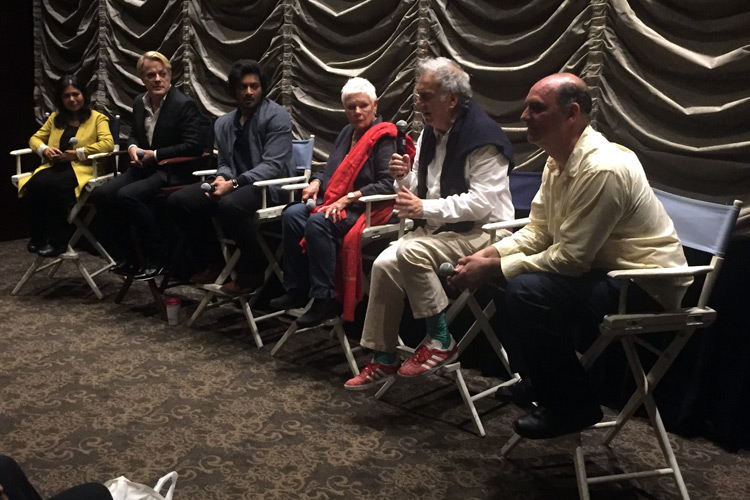The following questions and answers are excerpted from a conversation that followed the NBR screening of Victoria and Abdul.
Around 2004, you were doing research about curry during Queen Victoria’s time, and it seems you ended up finding much more than expected?
Shrabani Basu: I knew that that Queen Victoria loved her curry and she had so many Indian servants that cooked for her. But it was on a trip to the Osborne House, which you see in the film, that I spotted a a picture of Abdul Karim hanging in the Indian corridor. He’s painted in reds, golds and creams. It’s quite a wonderful portrait. It struck me that he was painted to look like a royal man, so that aroused my curiosity. There were more photographs throughout the house and even one of Abdul in her dressing area. That is right below a picture of Harry Brown. Seeing those pictures started it all. A few years later I went to Windsor Castle and did actual research. I asked to see Queen Victoria’s journals and a woman came in with a trolley of thirteen or so volumes. I had a lot of reading to do!
“She could have had a great relationship with Bertie and her other children, but she didn’t want any of that.”
Bertie is critical to the film. Eddie, can you talk about the process to preparing for this character?
Eddie Izzard: In the year before we filmed, I was running a bunch of marathons in South Africa like you do sometimes. So I was down to a very lean weight, but taking on this role, I had to get much bigger. I started eating cakes like Judy at the beginning of the film. I had to gain about twenty to thirty-five pounds. Then there’s the makeup and tailoring and lowering the voice into the ribcage that made Bertie to me. And then on set it’s toe-to-toe with mum because me and mum didn’t get along. Me and Judy get on well, but Victoria and Bertie did not like each other and she blamed him for the death of her husband. Bertie was an embarrassment to mum.
Judi Dench: Actually it was a huge waste. She could have had a great relationship with Bertie and her other children, but she didn’t want any of that. Instead she waits for someone like Abdul to come along.
Izzard: I think he’s a bit better looking than Bertie, who looks as though he’s eaten a cyborg or something by then.
From an acting and directing standpoint, how much does it mean to shoot in these real locations?
Stephen Frears: The Osborne House, which Albert built for Victoria, allowed us to film there. We were the first people and we were there for three weeks.
Ali Fazal: From an acting perspective, It just hit us all together when we entered Osborne house. We were right there in their bar room and it was so surreal to see Abdul Karim’s portrait for the first time. And during the scene of Queen Victoria’s death, just looking out the window and seeing everything as it was completely adds to the moment.
Dench: And your character lived in a house right around the corner out of sight.
Izzard: Yes. You see the big pigsty. I’m right there.
Fazal: I don’t know if anyone noticed, but everything, even the bed sheets, are so beautiful. The bed sheets in particular had these flowers with the stems in the shape of Victoria and Albert’s monogram.
Dench: The locations are wonderful and everyone on set was so respectful of the space. At one point when Ms. Fitz tells me to resign, they said that we were not allowed to stand on a blue strip. What you don’t see in that scene is that everyone comes in and does a little jump over a blue strip as they walk in. It has great charm to it.
The film condenses time in such a way that it doesn’t make a point of it, which creates a wonderful pace. How did you accomplish that?
Basu: I think we see Abdul put on weight, so that’s obviously a period he’s been away for six months or so and he’s got more medals. Small things like that tells the audience that time as passed.
Fazal: I thought that was brilliant that [Lee Hall, screenwriter] didn’t use timelines in the script, so it could’ve been a story over five days. It’s really thirteen years. What’s interesting is that it’s actually the costumes that take you through the period. If you look carefully, minor changes are evident here and there.
Frears: I had a very good crew that was conscientious and thorough, so I completely trusted them to help transform this.
Would you say that Abdul coming into Queen Victoria’s life is an echo, or repetition, of John Brown?
Dench: Both men fulfilled the same need that she had. The passion was something that she had for Albert, who was everything to her. When he suddenly he dies she has that tricky time until finding John Brown. That need in her was very powerful, so I think it’s worth telling the story. History views that Queen Victoria was the Empress of India and very dominating. We’ve got that idea of her, but she shows a passionate side to her. She allows herself this vulnerability that is surprising to discover.

